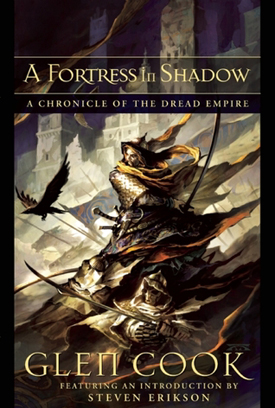The Fire in His Hands
With Mercy Toward None
 A Fortress in Shadow is an omnibus edition collecting Glen Cook’s two “prequel” novels to The Dread Empire trilogies. (Yes, there are two of them, which we have discussed here and here.)
A Fortress in Shadow is an omnibus edition collecting Glen Cook’s two “prequel” novels to The Dread Empire trilogies. (Yes, there are two of them, which we have discussed here and here.)
The story itself relates the rise of the Disciple, El Murid, among the peoples of the desert, Hammad al-Nakir, and his quest to re-establish the Empire of Ilkazar. We meet Haroun bin Yousif, who will become, after a bit of internecine politics within the ruling family, the last heir, the King Without a Throne. We meet Bragi Ragnarson, his foster-brother Haaken, and their friend Reskird Kildragon, three Trolledyngjian youths who’ve gone adventuring in the South (by necessity — they were on the losing side in a civil war). And last but certainly not least, we meet Mocker, the itinerant con artist and street performer of no known antecedents who becomes Bragi’s closest friend. And there you have most of the major characters of the Dread Empire saga.
If you’ve read any Cook, you have a good idea of the flavor of these two novels. Steven Erickson makes a point in his Introduction to this volume that resonated with me like a huge gong: “Suddenly, here, in my hands, was a work of fantasy that took the genre by its throat and squeezed. And even more enticing, it had the voice of the best of the Viet Nam novels I had been reading.” Yeah — what he said: that upending of the thematic conventions of the genre, the “creeping realism” of the Viet Nam era, the darkness that’s always hiding in the corners of anyone’s soul. And even though they first appeared fairly early in Cook’s career — 1984 and 1985, respectively — they exhibit that same relentless, subtle probing of character that one finds in the later novels of the series (“later” in order of appearance — in sequence of events, they’re all “later”) or in the Chronicles of the Black Company or The Instrumentalities of the Night.
Which leads to something that struck me about these two novels that I’ve noticed before with Cook, but not quite in this way: the scale is epic, while the focus remains intimate. In this case, we are given a milieu in which armies of tens of thousands move through most of the known world (although the Dread Empire itself is almost completely absent from this story), clashes of cultures as well as armies — indeed, “epic” is the only word that fits — while the story is about Bragi, and Haroun, and Mocker, and El Murid, and is told on a sometimes painfully human level.
That said, I should point out one thing that’s characteristic of Cook’s writing, but it’s in sharp relief here: he has an amazing ability to generate almost unbearable tension in the narrative, even though the actual events related may be almost mundane: it builds, and builds, until you can’t sit still any longer.
There’s not a whole lot more to say without going into details that would be out of place here anyway. If you know Cook, you know what you’re in for. If you don’t know Cook, this is as good a place as any to get acquainted.
(Night Shade Books, 2008)
